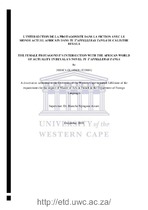| dc.contributor.advisor | Assam, Blanche Nyingone | |
| dc.contributor.author | Glaeser, Jessica | |
| dc.date.accessioned | 2020-02-14T13:59:37Z | |
| dc.date.available | 2020-02-14T13:59:37Z | |
| dc.date.issued | 2019 | |
| dc.identifier.uri | http://hdl.handle.net/11394/7107 | |
| dc.description | Magister Artium - MA | en_US |
| dc.description.abstract | In order to overcome the silence that had been instilled by colonialism, several postcolonial
female writers employ fiction to restore their local culture and reflect on their representation
in historical writings. For female writers, literature often becomes a medium through which
they can become active agents of their own destiny by establishing a voice for themselves.
Writing becomes a means of reclaiming traditional discourses relating to women.
The following study is primarily focused on Calixthe Beyala, a Franco-Cameroonian
novelist, and specifically concentrates on the manner in which Beyala makes use of her
female protagonist in Tu t’appelleras Tanga to portray the realities facing African
Francophone females. The study aims at illustrating that the female protagonist plays a
critical role in mirroring both the conditions of females in African societies and the
conditions pertaining to Womanism in a universal context. Through the analysis of the role of
the protagonist, the study reveals that there seems to be a relationship between fiction and
society which is definite enough for fictional characters to be used as prototypes for social
roles and attitudes. | en_US |
| dc.language | French | |
| dc.language.iso | fr | en_US |
| dc.publisher | University of the Western Cape | en_US |
| dc.subject | Females | en_US |
| dc.subject | Fiction | en_US |
| dc.subject | Colonialism | en_US |
| dc.subject | French literature | |
| dc.title | The female protagonist’s intersection with the African world of actuality in Beyala’s novel Tu t’appelleras Tanga | en_US |
| dc.rights.holder | University of the Western Cape | en_US |

